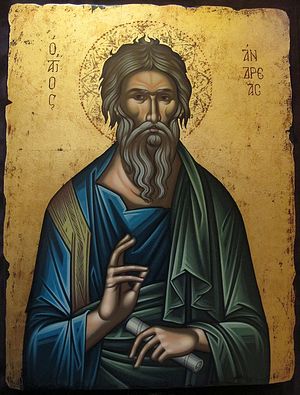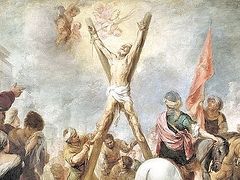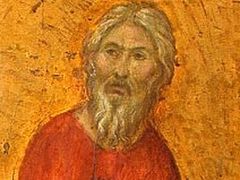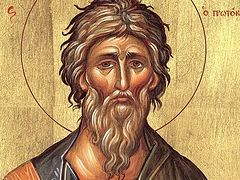Quench not the Spirit
(1 Thess. 5:19)
Today we celebrate the memory of the holy apostle Andrew the First-Called. This apostle has great meaning for the Russian Church. According to tradition, during his evangelical journeys he reach the hills of Kiev and erected a cross there, blessed them and pronounced this prophecy: “On these hills God’s grace will shine, and a great city will be founded here, and the Lord will raise up many churches in it.” Thus in Rus’, before a Russian state was created, the beginnings were laid of an Apostolic Church, for at its foundation was the Gospel proclaimed by one of the apostles. The holy apostle Andrew’s declaration about Kiev was fulfilled during the time of the holy Equal-to-the-Apostles Prince Vladimir. In his days the fire of the grace of the Holy Spirit that had descended upon the Apostle Andrew on the feast of Pentecost shone first in Kiev, and then over all Rus’. The Church that arose in Rus’ entered the fold of universal Churches, in which the grace of the Holy Spirit, enlightening and illumining, will remain to the end of ages.
And each one of us is a participant in this grace. At the very beginning of our lives we received it in the sacraments of Baptism, Chrismation, and Communion. And thanks be to God, many of us have preserved this grace, and through its help have significantly progressed in labors of piety and virtue. What a pity it is however that this cannot be said for all of us! The fire of grace that was lit in each of our souls is barely noticeable in many of us. In many of us we can see neither light, nor warmth in the soul, as if they had never even come into contact with the fire of grace, as if they were not Christians but heathen and pagans.
What causes this manifestation worthy of lamentation? Why doesn’t the fire of grace given to us not manifest its saving power, does not burn in us, or burns only barely noticeably? It is for the same reason that the material fire in a furnace or oil lamp goes out. If you want that fire to go on burning, don’t spare the firewood and oil—stoke the furnace with wood and pour oil into the lamp. Do the same with regard to the fire of grace. Quench not the Spirit of grace, support its burning through your personal efforts, personal zeal for progress in the spiritual life. We beseech you, writes the apostle Paul to the Corinthian Christians, that ye receive not the grace of God in vain (1 Cor. 6:1); that is, do not think that God’s grace given to you consists only in the forgiveness of sins and bears no other obligations. No, the Lord also requires labors of zeal for correcting our lives. For if after receiving forgiveness of sins and making peace with God we live just as we did before, that would be the same as again becoming His enemy and receiving grace in vain. Grace will not save us if we live an impure and dishonorable life; to the contrary, it will increase our responsibility for our sins if after such a great gift we return to our former wickedness.
Thus, we are required after having received grace, with its help, to make every effort to exercise ourselves in divine contemplation, in studying the truths of our faith, in guarding ourselves from error and false thinking, so that not only would we ourselves be free of them, but would be able to give others an account of our hope and bring the unbelievers and false thinkers to reason. If grace is a fire that warms the soul, then let us strive to assimilate the teachings of the faith not only with our minds but also with our hearts, and be guided by it in our lives. Good it is for the one who receives the teachings of the faith into his heart and delights in them. The heart that is warmed by love for the Lord’s commandments makes fulfilling them easier, for love has such power that the one who loves never wearies of any labors and podvigs to please the Beloved.
Brothers, let us thank the Lord, who has placed the fire of grace in our hearts, and let us warm it with zeal for the correction of our lives and progress in a life of holiness pleasing to God.
From: Homilies given in Kostroma in 1897 by Bishop Vissarion (Moscow: University printing press, 1899), 281–283.




